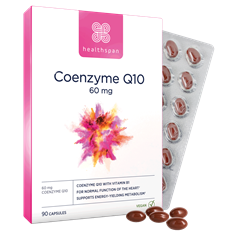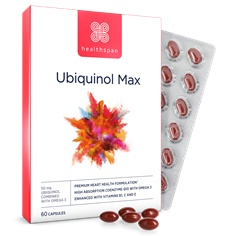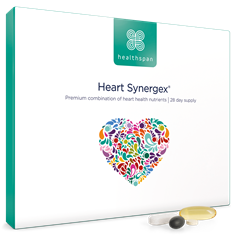CoQ10 and Ubiquinol Supplements
Coenzyme Q10 (often shortened to CoQ10) is found naturally in the body, in every one of our cells – and in particularly high concentrations in the heart. As a result, it is nicknamed the 'body's spark plug' and is often combined with thiamine in heart health supplements to support normal energy-yielding metabolism and the normal function of the heart.
Coenzyme Q10 is also available in another, more body-ready form known as ubiquinol. Our levels of CoQ10 fall naturally with age, so most CoQ10 users over the age of 50 opt for ubiquinol supplements to ensure they obtain the maximum benefits.
Healthspan offers some of the highest concentrations of coenzyme Q10 and ubiquinol supplements available in the UK.
Healthspan customer reviews
Coenzyme Q10 and ubiquinol guides




What is coenzyme Q10?
Coenzyme Q10 can be found inside every cell in the body, inside the mitochondria. This part of the cell is effectively the 'powerhouse', which drives the cell machinery and helps convert food into energy. Given this important role, it is not surprising that coenzyme Q10 is found in particularly high concentrations in the heart.
Many people start taking Coenzyme Q10 supplements around midlife, to support the body's declining natural CoQ10 levels. As well as producing less itself, the body is also less efficient at absorbing coenzyme Q10 from the diet, and at converting it to the bioavailable ubiquinol form. That's why ubiquinol supplements are particularly recommended for those over the age of 50.
In terms of attaining enough coenzyme Q10 from the diet, key sources include oily fish, organ meats, and whole grains. Vegetarian sources – soy beans, broccoli, pistachios, peanuts, and sesame seeds – contain considerably less. As a result, supplements can be a useful way to ensure you're getting enough of this important nutrient.
What's the difference between coenzyme Q10 and ubiquinol?
Although coenzyme Q10 is often used as a blanket term, there are two types CoQ10: the oxidised version (called ubiquinone, or simply CoQ10) and the non-oxidised option, ubiquinol.
Ubiquinol is the most absorbable form of CoQ10, because it requires no conversion – which means the body can absorb and use it quickly. As a result, ubiquinol is the preferred form for those who are older, or who have health-related concerns about low levels.
Types of CoQ10 and ubiquinol supplements
Healthspan offers a range of coenzyme Q10 supplements as well as ubiquinol, to ensure there's an option for everyone.
If you're looking for the best CoQ10 supplement, opt for an oil-based capsule, rather than a tablet, for better absorption and therefore better results. You should also ensure you have a good intake of B and C vitamins, too.
In general, supplement doses range from 10mg to 100mg daily – although higher 600mg amounts are sometimes given for therapeutic use. No serious side effects have been reported at recommended doses, but always check with your GP before adding a new supplement to your routine, and follow the dosage advice on the pack.
Experts also advise taking coenzyme Q10 in the morning, rather than at night.
Coenzyme Q10 supplements
Healthspan's supplements provide coenzyme Q10 in its purest form, with vitamin B1 to support heart health and energy levels.1 It's also a natural form, which means it doesn't contain some of the impurities that can contaminate some synthetically produced supplements.
The range includes Coenzyme Q10 200mg, one of the strongest supplements available in the UK, perfect for those who want the optimum amount.
There's also Coenzyme Q10 100mg and Coenzyme Q10 60mg for those who are new to the range and may want to start at a lower level to see which strength suits them best.
All three of Healthspan's coenzyme Q10 supplements use an innovative rapeseed oil base to ensure faster absorption and optimum benefits.
Ubiquinol supplements
Made using coenzyme Q10 in its non-oxidised, highly absorbable form, Healthspan's ubiquinol supplements are true market leaders, with formulations created by experts. This means that every capsule delivers more.
Healthspan's Ubiquinol capsules contain 100mg of ubiquinol, which is equivalent to 280mg of coenzyme Q10 because of its body-ready form, which allows for fast, optimal absorption. Each daily capsule also contains vitamin B1 to help support cardiac function and energy levels.2
The strongest and most premium ubiquinol product in the range – Ubiquinol Max – was created in conjunction with a leading cardiologist. Alongside an equivalent dose of 280mg of CoQ10 (100mg ubiquinol), it also contains sustainably sourced DHA and EPA omega 3 fish oil to help maintain normal blood pressure and blood triglyceride levels,3 vitamins B1 and C for further heart and energy support,4 and vitamin E to help protect cells from oxidative stress.
Who should take CoQ10 supplements?
A combination of factors – including the fact that with age our body produces less coenzyme Q10, and is less able to transform coenzyme Q10 into the more bioavailable ubiquinol – means that many people might benefit from CoQ10 supplements.
This particularly applies to those over the age of 50 – but levels can begin to drop as early as our twenties. Those following plant-based diets can also be at risk of low levels.
To get the optimum benefits from CoQ10 or ubiquinol supplements, experts advise taking them in the morning, with a meal that contains oil or fat (as CoQ10 is fat-soluble).5 As with all supplements, the best results come with consistency, so follow the dosage advice on the pack and take them every day. Some people will notice an immediate difference, but for most the full benefits will be apparent after 8-12 weeks of consistent use.
If you're still not sure which supplement is best for you, Healthspan has identified the best value, bestseller, and best products in all our the most popular categories – including coenzyme Q10 and ubiquinol.
As ever, you can also get in touch for more help or advice. The Healthspan team is available seven days a week in our UK-based call centre.
1Thiamine contributes to normal energy-yielding metabolism and contributes to the normal function of the heart.
2Thiamine contributes to normal energy-yielding metabolism and contributes to the normal function of the heart.
3The beneficial effect is obtained with a daily intake of 3g combined EPA and DHA for the maintenance of normal blood pressure and 2g for normal blood triglyceride levels. 5g daily should not be exceeded.
4Thiamine (vitamin B1) contributes to the normal function of the heart. Vitamin C contributes to normal collagen formation for the normal function of blood vessels.
5Saini, R. (2011). Coenzyme Q10: The essential nutrient. J Pharm Bioallied Sci. 3(3): 466- 467. doi: 10.4103/0975-7406.84471








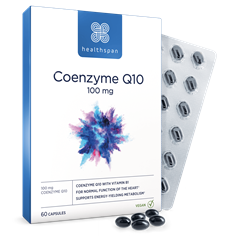
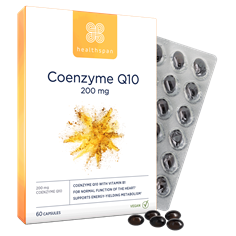
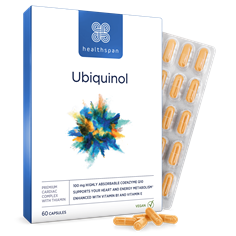
%202.png)
